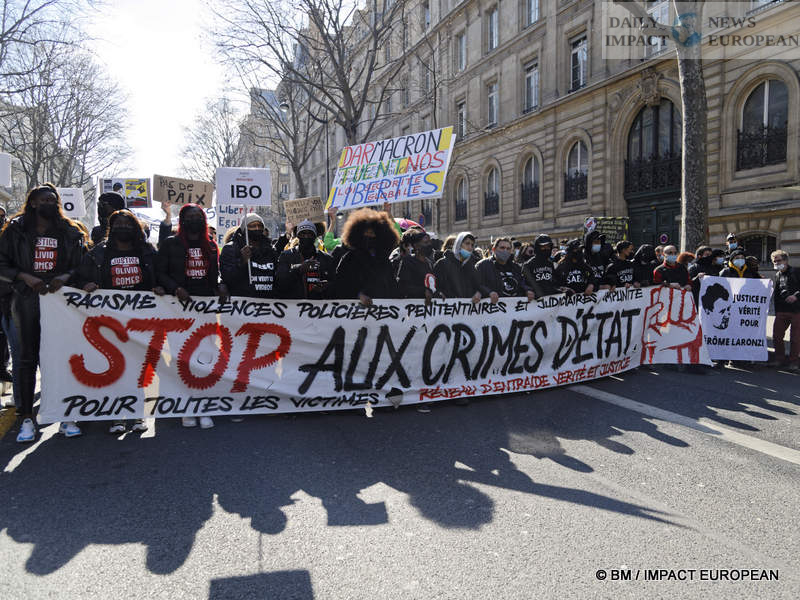Saturday, March 20 in Paris, several thousand people in the streets to demand justice on behalf of people who died during interventions by the police. The names of the victims were posted on the walls of the capital, painted on the sidewalks, brandished on placards, chanted by thousands of demonstrators who came to protest against racism and police violence. Their slogans: « Stop police violence », « Stop impunity », « No justice, no peace ».
About thirty families of victims, grouped together demanding justice and truth for those close to them: Ali Ziri, Lamine Dieng, Cédric Chouviat, Allan Lambin or even Mohamed Gabsi, victims of police violence.
If this network officially saw the light of day in February, the march has been organized every year since 2011. Established by the Vies volées collective, it is always backed by two international days: those against violence committed by the forces of the Order (March 15) and that for the Elimination of Racial Discrimination (March 21).
In Paris, the procession of families of victims was followed by activists from the Solidarity March, the Front against Islamophobia, as well as the Stop Global Security Law coordination. Several thousand people marched in the streets of the capital (3,500 according to the prefecture, more than 5,000 according to the organizers), from the Luxembourg Gardens to the Place de la Bastille, all surrounded by a large police force.
This is the first time that Jimony Rousseau’s family has participated in this march. « It gives strength in the fight, we feel surrounded », reports Moy, the cousin of this young man of 28, who died at the beginning of February while he was detained in the prison of Meaux (Seine-et-Marne), a few days after being « overpowered » by supervisors during an incident. Following the tussle, Jimony Rousseau, who had a heart attack, was admitted to hospital. An investigation has since been opened to determine the possible responsibility of guards, and the Minister of Justice, Eric Dupont-Moretti, has appealed to the General Inspectorate of Justice.
Assa Traoré, who has become one of the important voices in the fight against police violence since the death of his brother Adama in 2016, listed the demands of the demonstrators, in particular « the end of permanent identity checks », « the ban suffocation techniques ”and“ weapons classified as weapons of war ”(LBDs and grenades) and the creation of an“ independent body ”to investigate complaints against the police.
It also demanded the “immediate suspension” of the agents implicated for violence or homicide as well as their “final expungement” if a conviction was pronounced against them.
Testimonies from victims of police violence have been broadcast, such as that of Fatou Dieng, the sister of Lamine Dieng, who died in 2007 by ventral tackling, in a police van in Paris. « We fought for thirteen years before the French state recognized its responsibility and its guilt before the European Court of Human Rights, by compensating the family » …
“We have been served justice, but it is bitter justice because the police have not been convicted and continue to practice. They are never punished. What we want is for the security forces to be indicted and punished, like everyone else, « she said at the microphone.
Also present were relatives of Claude Jean-Pierre, a sixty-year-old who died following a gendarmerie check in Guadeloupe in November 2020. A judicial investigation was also opened. « The problem is that, despite a video which shows the facts, despite an autopsy which [makes the injuries coincide] with the conditions of the intervention, there is still no indictment », deplores Christophe , his son-in-law, believing that there is « a real problem at the level of justice when the police are involved ».
“These cases are not in the minority; those we hear about are only the tip of the iceberg, the phenomenon is massive, « according to Farid El-Yamni, brother of Wissam El-Yamni, who died in 2012 in Clermont-Ferrand. According to a census by the Bastamag news site, 26 people died as a result of law enforcement intervention in 2019, and 29 in 2020. The site has recorded 746 deaths over the past forty-four years.
As for the wounded, the group Les mutilés pour l’example has around thirty people who have lost an eye, a hand or a foot, or who have been victims of a head trauma. Like Vanessa Langard, 35, injured by an LBD shot in the left orbit during a demonstration of « yellow vests » on the Champs-Elysées, in Paris, in December 2018. The young woman came to testify to the consequences that such interventions can cause. “My daily life is furnished with care. My brain was very damaged: this is the reason why I have problems with memory, concentration, problems with cognitive thinking, ”says this former decorator, who now lives on a disability pension. .
Alain Hoffmann has not recovered either. He too was shot by LBD during a ‘yellow vests’ demonstration in December 2018. “I was under the Arc de Triomphe, taking pictures. I was shot. The carotid artery was exposed. The doctor told me that within two millimeters I was dead, « said the 56-year-old former soldier. Following this incident, Alain suffered from depression and lost his job. “It shattered my life. «
The demonstrators denounce the restriction of freedoms symbolized in particular by the global security law or that against separatism, at the national level, Rennes, Bordeaux or Lyon, Alpes-de-Haute-Provence, etc.
Views: 2






































More Stories
Premiere of « Gourou » at Pathé
Rétromobile 2026 – 50 Years of Automotive Heritage, Innovation, and Passion
Marek Halter at 90: A Lifetime of Memory, Writing, and the Pursuit of Peace